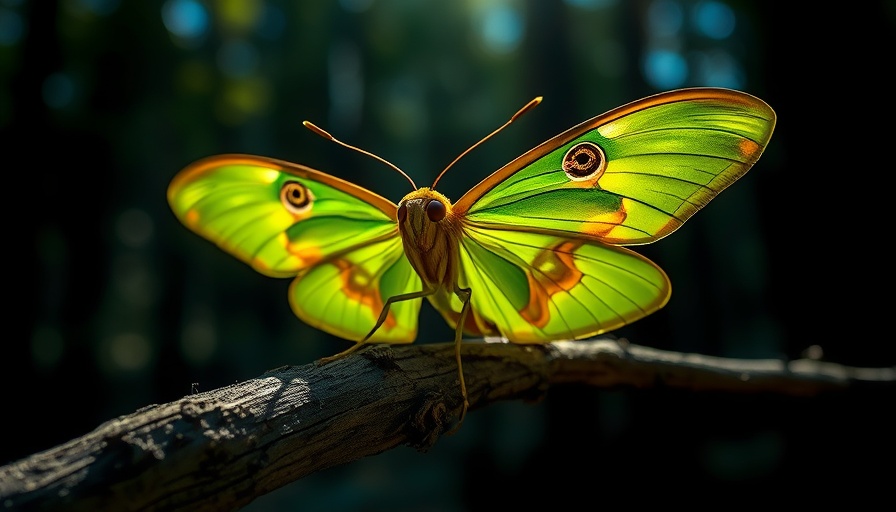
The Night Shift of Nature: Pollination Beyond Daylight
Pollinators play a pivotal role in agriculture and ecosystem health, traditionally associated with the vibrant activity of bees, butterflies, and birds during the day. However, recent groundbreaking research from Lund University in Sweden highlights a crucial aspect of pollination that has largely remained in the shadows—nocturnal pollinators. According to the study, which synthesizes data from over 135 different studies, nocturnal pollinators like moths and bats are equally vital for many plant species, challenging long-held beliefs about pollination activity.
The Surprising Outcomes of the Global Study
The meta-analysis revealed that 90% of plant species examined exhibited similar reproductive success, regardless of whether they were pollinated at night or during the day. This stresses the flexibility in pollination, where various pollinators can contribute to a plant's reproduction. Liam Kendall and Charlie Nicholson, the researchers behind the study, expressed their astonishment at the findings, noting that it prompts a reevaluation of how we view the relationships between plants and their pollinators. They propose that the ecological narrative is not only about specific pollinators for specific plants but rather a complex network of interactions that can support biodiversity.
A Growing Concern for Nocturnal Pollinators
While daytime pollinators tend to receive substantial attention and protection efforts, their nocturnal counterparts often get overlooked. This lack of recognition could have dire implications for ecosystems dependent on these night-time workers. As the climate changes and habitats are increasingly altered, understanding and protecting both types of pollinators is essential for maintaining ecological balance and food security.
The Importance of a Biodiverse Pollination Strategy
For boutique hospitality professionals, these insights highlight the importance of biodiversity in their gardens and landscapes. Incorporating a variety of flowering plants that attract both day and night pollinators can create rich, sustainable environments that enhance guest experiences. Such ecosystems not only beautify the properties but also contribute to local biodiversity and health. This aligns perfectly with the growing trend in eco-conscious travel, where guests value sustainability and environmental stewardship.
Practical Steps to Enhance Pollinator Habitats
Considering the essential role of both nocturnal and diurnal pollinators, here are some actionable tips for boutique hospitality owners:
- Plant Diversity: Introduce a wide range of native flowering plants that bloom at different times, attracting both day and night pollinators.
- Reduce Light Pollution: Limiting artificial light during evening hours can maintain the natural behaviors of nocturnal pollinators.
- Organic Practices: Avoid the use of pesticides and chemicals that could harm both types of pollinators, promoting healthy, thriving ecosystems.
- Eco-Centric Activities: Engage guests with workshops focused on sustainable practices like chaos gardening, teaching them the importance of all pollinators.
Future Trends and Opportunities in Hospitality
As the call for climate awareness grows, the hospitality industry is increasingly exploring ways to incorporate sustainable practices into their operations. In the context of the recent findings on nocturnal pollinators, there exists an opportunity for boutique hospitality businesses to position themselves as leaders in eco-friendly tourism. Offering guests experiences that celebrate biodiversity—such as guided night walks to observe nocturnal pollination—can create memorable stays while fostering a deeper connection to nature.
Conclusion: Protecting Our Pollinators
As evidence mounts regarding the importance of nocturnal pollinators, it’s critical for us to revise our conservation efforts to include these essential species. For hospitality professionals striving for sustainability, enhancing pollinator-friendly landscapes can not only improve environmental health but also enrich guest experiences. By taking actionable steps and promoting awareness around the vital role of all pollinators, we contribute to a healthier planet.
For those interested in building eco-conscious lodging businesses, now is the time to act—creating spaces that not only appeal to visitors but also support the local ecosystem and its critical pollinators.
 Add Row
Add Row  Add
Add 




 Add Row
Add Row  Add
Add 

Write A Comment